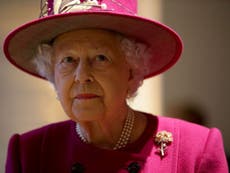The Independent's journalism is supported by our readers. When you purchase through links on our site, we may earn commission.
50 years after exposing shocking practices in medicine, it is still happening in the UK today
People who raise red flags are essential safety valves against all-powerful organisations and individuals


Exactly 50 years ago, one of the most important whistleblowing books in the history of post-war medicine was published, and a new biography on the author ensures we will not forget his legacy.
Human Guinea Pigs: Experimentation on Man was written by Dr Maurice Pappworth to shed light on unethical experiments that were being conducted without the full knowledge of the patient. The book caused a sensation and a predictably furious reaction from many in the medical establishment. It detailed experiments on children, inmates of mental and penal institutions, as well as other vulnerable patients whose lives were often damaged for what Pappworth argued were the career enhancements of the medics involved.
Arthur Koestler, author of Darkness at Noon, expressed his horror at the experiments, which were “carried out on children, pregnant women, mentally defective, on patients before and after an operation,” and even on those with incurable diseases.
The book made a significant impact on the development of medical research ethics, and the adoption of stricter codes of practice for human experimentation. Research ethics committees established soon after remain in place today.
Pappworth’s daughter Joanna published a book this week called The Whistle Blower: The Life of Maurice Pappworth: the Story of One Man's Battle Against the Medical Establishment. It is a piercingly candid portrait of the battle her father endured while writing Human Guinea Pigs. Even today, as the leading oncologist Martin Gore observed in the foreword, "there are still controversies over the ethics and conduct of some trials particularly, but not exclusively, in relation to those performed in the developing world where standards of care are not the same as in the countries of the trial sponsors."
Whistleblowers often suffer in their own careers and with their psychological health. The biography’s final words are: "As an outsider, he could readily raise the whistle to his lips. But this didn’t make the anxieties and ostracism any easier to bear, once the whistle’s shrill voice had filled the air."
The book had a cost for Joanna too. She wrote it in the final stages of an incurable cancer, inspired to write the book after she had a vision of her father as she lay in hospital the night before a major operation. She was determined to complete the book and see the record for her father put straight, completing it just days before she died.
Whistleblowing is needed as much as ever in a world where an all-powerful medical establishment continues to place the pursuit of science above the welfare of patients, if it can get away with it. In the US, pregnant woman have been forced to have caesarean sections against their will. In Britain, recent whistleblowers have included Dr Stephen Frost, the Ministry of Defence doctor who raised the alarm on missing morphine, Dr Raj Mattu, who was sacked after exposing concerns about patient safety in the NHS and Elaine Chubb, who resigned after she accused colleagues of abusing frail residents of a Bupa-run home for the elderly.
Those who dare to speak out act as essential safety valves against all-powerful organisations and individuals. Not even the BBC could find whistleblowers to speak out against decades of depraved behaviour by Jimmy Saville. That tells us a great deal about power and how hard it is to challenge those who have it. Harvey Weinstein and Kevin Spacey are similar God-like figures in Hollywood whose behaviour was allowed to go unchecked for decades. The Paradise Papers is an example of whistleblowing this week, as the documents detailed offshore investments of 120,000 people and companies and leaked them to a German newspaper which promptly shared them with the International Consortium of Investigative Journalists.
People who blow the whistle continue to do so at great risk to their livelihoods and even to their safety, which is why so many are reluctant to come forward. Charities called earlier this year for corporations and banks to offer more protection to workers who flag up internal concerns after the chief executive of Barclays attempted to track down the author of anonymous letters. Had whistleblowers been better protected, irregularities at the charity Kids Company, founded in 1996 by Camila Batmanghelidjh to provide support for deprived inner city children, might have come to light earlier. The charity, which was doing much good, was dissolved into 2015.
One wonders how many abuses are allowed to continue, and for how long.
Not all whistleblowing is however necessarily noble or valuable. In my view, some who raise the flag risk damaging national security, such as former CIA employee Edward Snowden who leaked classified information to the media in 2013. Some whistleblowers do so for personal revenge or aggrandisement. Others appear to be plain deluded. Worryingly, elements in the police appear over-ready to give them credence.
But a climate in which whistleblowing is readily accepted, we will be able to swiftly root out those with bad intentions and help ensure that powerful individuals and organisations moderate their behaviour and conduct themselves in an ethical manner.


Join our commenting forum
Join thought-provoking conversations, follow other Independent readers and see their replies